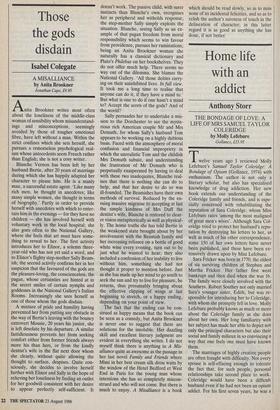Those the gods disdain
Isabel Colegate
A MISALLIANCE by Anita Brookner
Jonathan Cape, £9.95
Anita Brookner writes most often about the loneliness of the middle-class woman of sensibility whom misunderstand- ings and misconceptions, seemingly avoided by those of tougher emotional fibre, have left without a man. Within the strict confines which she sets herself, she pursues a remorseless psychological real- ism whose antecedents seem French rather than English; she is not a cosy writer.
Blanche Vernon has been left by her husband Bertie, after 20 years of marriage during which she has happily adapted her character to please him. He is a manly man, a successful estate agent. 'Like many rich men, he thought in anecdotes; like many simple women, she thought in terms of biography.' Partly in order to provide herself with anecdotes with which to enter- tain him in the evenings — for they have no children — she has involved herself with voluntary work in the local hospital; she also goes often to the National Gallery, where she feels that art must have some- thing to reveal to her. The first activity introduces her to Elinor, a solemn three- year-old who has not yet said a word, and to Elinor's flighty step-mother Sally Beam- ish; the second activity confirms her in her suspicion that the favoured of the gods are the pleasure-loving, the conscienceless, the pagan, whose certainties are hinted at in the secret smiles of certain nymphs and goddesses in the National Gallery's Italian Rooms. Increasingly she sees herself as one of those whom the gods disdain.
A mixture of pride and humility having prevented her from putting any obstacle in the way of Bertie's leaving with the bouncy extrovert Mousie, 20 years his junior, she is left desolate by his departure. A similar fastidiousness prevents her from seeking comfort either from former friends always more his than hers, or from the kindly dentist's wife in the flat next door whom she clearly, without quite allowing the thought to surface, despises. Quite con- sciously, she decides to involve herself further with Elinor and Sally in the hope of relieving her loneliness by finding an outlet for her goodwill consistent with her desire to appear perfectly self-sufficient. It doesn't work. The passive child, with surer instincts than Blanche's own, recognises her as peripheral and witholds response; the step-mother Sally simply exploits the situation. Blanche, seeing Sally as an ex- ample of that pagan freedom from moral responsibility which seems to win favour from providence, pursues her ruminations; being an Anita Brookner woman she naturally has a classical dictionary and Plato's Philebus on her bookshelves. They do not offer much help. There seems no way out of the dilemma. She blames the National Gallery. 'All those deities carry- ing on their uninhibited lives. In full view. It took me a long time to realise that anyone can do it, if they have a mind to.' But what is one to do if one hasn't a mind to? Accept the scorn of the gods? And of the world?
Sally persuades her to undertake a mis- sion to the Dorchester to see the myste- rious rich American couple Mr and Mrs Demuth, for whom Sally's husband Tom appears to be working on a highly dubious basis. Faced with the atmosphere of moral confusion and financial impropriety in which the unrealistic Tom and the childish Mrs Demuth subsist, and understanding the frustration of Mr Demuth who is perpetually exasperated by having to deal with these two inadequates, Blanche real- ises that there is nothing she can do to help, and that her desire to do so was ill-founded. The Beamishes have their own methods of survival. Reduced by the en- suing massive migraine to accepting at last the simple kindness of Mrs Duff the dentist's wife, Blanche is restored to clear- er vision metaphorically as well as physical- ly. The home truths she has told Bertie in the weakened state brought about by her involvement with the Beamish family and her increasing reliance on a bottle of good white wine every evening, turn out to be just what he wanted to hear; they also included a confession of her inability to live without him, something she had not thought it proper to mention before. Just as she has made up her mind to go south to seek the sun and try to live for pleasure, he returns, thus presumably bringing about the effective clipping of wings at last beginning to stretch, or a happy ending, depending on your point of view.
The fact that the ending can be con- strued as happy means that the book can be seen as a comedy, but Anita Brookner is never one to suggest that there are solutions for the insoluble. Her dazzling skill and excellent literary judgment are evident in everything she writes. I do not myself think there is anything in A Mis- alliance quite as awesome as the passage in her last novel Family and Friends where Mimi in her best cream silk dress waits by the window of the Hotel Bedford et West End in Paris for the young man whose intentions she has so completely miscon- strued and who will not come. But there is much to enjoy. A Misalliance is a book which should be read slowly, so as to miss none of its incidental felicities, and so as to relish the author's sureness of touch in the delineation of character; in this latter regard it is as good as anything she has done, if not better.










































 Previous page
Previous page